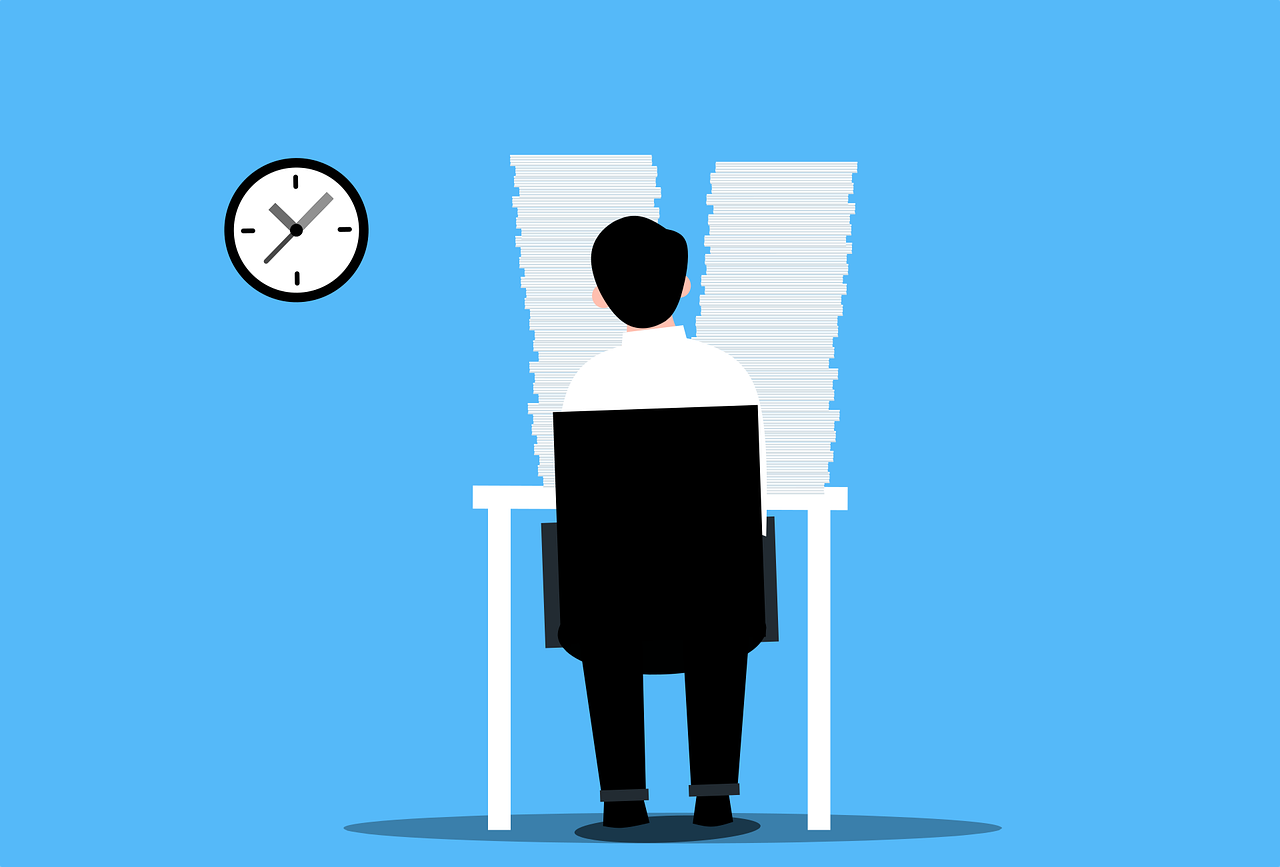Feeling overworked is a common experience for many people, whether you're a student with a heavy course load, an employee juggling multiple projects, or a parent trying to balance work and family responsibilities. Overworking yourself can lead to burnout, which can affect your mental health, physical well-being, and overall productivity. There are many small (and major) successes to experience at work every day, whether you're pursuing your passion or congratulating yourself on a job well done. But while working hard is great, but living well is just as significant.
It's important to recognise when you're feeling overwhelmed and take steps to manage your workload and prioritise your self-care. In this blog, we'll explore practical tips and strategies for dealing with feelings of overwork and avoiding burnout.
Table of Contents
- Feeling Overworked: What does it mean?
- Signs of Being Overworked
- Moving towards Good Mental Health
- Future of Work
- Conclusion
- Frequently Asked Questions
Feeling Overworked: What Does It Mean?
Feeling overworked refers to a state of being overwhelmed or excessively burdened with work or other responsibilities. It can occur when an individual has too many tasks or deadlines to manage, or when they are working long hours without enough rest or breaks. Overworking can cause physical and mental exhaustion, leading to symptoms such as fatigue, irritability, difficulty concentrating, and a decline in work performance.

For example, you have been working long hours for several weeks now, trying to complete multiple projects and meet tight deadlines. You feel like you never have enough time to take a break or even catch up on basic tasks like responding to emails or taking care of personal errands. You're constantly worried about falling behind and letting down your team or clients. As a result, you feel exhausted, stressed, and irritable. You're struggling to focus on your work and finding it difficult to motivate yourself to keep going.
Signs of Being Overworked:
If left unaddressed, feeling overworked can lead to burnout, which is a state of chronic stress characterised by emotional exhaustion, cynicism, and reduced personal accomplishment. Here are some signs of overworking:
- You feel exhausted, both physically and mentally
- You have difficulty sleeping or insomnia
- You are suffering from chronic stress or anxiety
- Your work performance and productivity has gone down
- You are more prone to irritability or mood swings
- You have been neglecting personal relationships and hobbies
- You feel overwhelmed and unable to prioritise tasks
- You have frequent headaches or other physical symptoms of stress
- You are resorting to clinical drugs or alcohol as a coping mechanism
- You feel like you can never catch up or are always behind on work
- You have been skipping meals or not eating properly due to lack of time or energy
- You are working long hours without taking breaks or time off
- You are having a negative attitude towards work or feeling cynical
- You are struggling to concentrate or remember details
- You are feeling emotional exhaustion, detachment, and a reduced sense of accomplishment
Setting boundaries and telling your management about them will help you deal with any personal feelings of overwork. Long-term burnout can negatively affect your health, resulting in poor sleep or low energy levels and the negative effects of overworking.
Feeling Overworked: How to Resolve?
There are two frameworks to understand what’s going wrong.
First, when you work hard but don't see good results, you may feel overwhelmed, tired, and unmotivated. This could happen if your work involves depending on others, which can cause inefficiencies and waste your effort. You may have to work harder to communicate and collaborate with others, which can be a drain on your energy. If you're in this situation, it's important to identify the reasons for the inefficiencies and think about how to address them.
Second, when there are inefficiencies that you can't control, or you may not have the right skills to do the work. This can be overwhelming and lead to burnout, especially if you're putting in a lot of effort but not seeing results. Soft skills you've learned may not always help when dealing with people in a company. If the task is too complex, it can be difficult to solve it alone. To address this, ask yourself if you can break down the task into smaller chunks. If the effort is due to dependencies, try to reduce them. If it's due to inefficiencies, try to resolve them. By simplifying the task, you may be able to tackle it more effectively and reduce stress and anxiety.

If you're feeling overworked, there are several steps you can take to resolve the issue and improve your work-life balance. Here are some tips:
- Prioritise self-care: Make sure you're getting enough sleep, eating nutritious meals, and engaging in regular exercise or physical activity. Taking care of your physical health can help you manage stress and feel more energised.
- Set boundaries: Establish clear boundaries between work and personal life, and stick to them. This may mean disconnecting from work emails and phone calls after a certain time of day or on weekends, and prioritizing personal time for self-care and hobbies.
- Learn to say no: If you're feeling overwhelmed with work, learn to say no to additional projects or commitments. Be honest about your workload and the time it will take to complete tasks, and ask for help or support when needed.
- Practice time management: Use time management techniques such as creating a to-do list or schedule, prioritizing tasks, and breaking down large projects into smaller, manageable tasks. This can help you stay organised and on track, reducing feelings of stress and overwhelm.
- Take breaks: Make sure to take regular breaks throughout the day, including lunch breaks and short walks. Taking breaks can help you recharge, reduce stress, and improve focus and productivity.
- Seek support: If you're feeling overwhelmed, don't hesitate to seek support from friends, family, or a mental health professional. They can provide a listening ear and help you develop coping strategies to manage stress and improve your overall well-being.
Moving towards Good Mental Health
Good mental health and greater well-being depend on finding a healthy balance between your employment and personal life. Clarity and effective communication are essential whether you're trying to support overworked team members or manage your own symptoms of burnout.
You can succeed in your career and other areas of your life by striking a healthy balance between working hard and living well. We must adopt a new mentality that values balance, productivity, and efficiency as the gold standard rather than celebrating long hours and "passion" to save our minds and our bodies. We can start by seeking assistance.
In his latest video, SoME Founder & CEO Rakesh Godhwani discusses a practical framework that can help us tackle being overworked.
Future of Work
The future of work is getting more and more interesting, but it doesn’t mean working less. But it’s going to get more complex, a lot more competitive. So all of us should learn to brace ourselves for this world which is highly VUCA (volatility, uncertainty, complexity and ambiguity) where getting good jobs is not going to be that easy.
Many of us will have to struggle with one too many jobs. In fact, about a hundred years ago, a lot of people struggled with two or three jobs in a day just to earn enough to pay their bills, and that day is happening again now because of massive inflation. As a result, jobs are fewer, everything is getting expensive, so we have to work harder. Looking at all of us, who look at work as a very important meaning of our lives, are also dependent on work to pay our bills, and this portion of people is a significant part of the population of the working community.
Useful Resources: best communication skills course | leadership communication program
Conclusion
In today's world, having work and being busy is often seen as a gift, and many people view their work as a defining part of their identity. However, it's important to remember that work is not the only thing that gives our lives meaning. While work can bring out our love, creativity, and produce great things, it's also important to find a balance between work and other aspects of our lives. Rather than simply working to retire and avoid work altogether, we should strive to use our capabilities to create something great and pursue multiple opportunities that align with our passions and values. Working hard can be a gift, but it's important to remember that it's just one part of a fulfilling life.
Frequently Asked Questions
1. Can you share some tips for managing too much work?
When you're feeling overwhelmed with work, it can be challenging to know where to start to manage the workload. One of the first things you can do is prioritise your tasks and create a schedule to manage your time efficiently. Make sure you identify which tasks are most urgent and important and focus on those first. You may also want to consider delegating some tasks to colleagues who have the skills and capacity to handle them. Additionally, it's important to take regular breaks and practice self-care to avoid burnout. Set boundaries around your work schedule, and avoid taking on additional tasks if you're already feeling overwhelmed. Finally, it may be helpful to speak with your manager about your workload to see if there are any resources or support, they can offer to help you manage your tasks more effectively.
2. How to speak to your manager about your heavy workload?
When speaking with your manager about your heavy workload, it's important to approach the conversation with a solution-oriented mindset. Here are some steps to consider:
- Identify specific tasks or projects that are causing you to feel overwhelmed and stressed.
- Prioritise those tasks based on their urgency and importance.
- Develop a plan for how you can address the workload, whether that means delegating some tasks to others, reprioritizing tasks, or negotiating deadlines.
- Schedule a meeting with your manager to discuss your workload concerns.
- Clearly and respectfully explain your concerns and provide specific examples of how the workload is impacting your productivity and well-being.
- Offer your proposed solutions for addressing the workload and ask for your manager's input and support.
- Work collaboratively with your manager to come up with a plan that works for both of you.
Remember to stay calm and professional during the conversation, and focus on finding solutions rather than placing blame or making demands. By approaching the conversation in a constructive and collaborative manner, you are more likely to achieve a positive outcome that benefits both you and your employer.
3. Is it okay to pushback when feeling overworked?
Yes, it is okay to push back when you're feeling overworked. In fact, it's important to speak up and communicate your concerns. Pushing back can help prevent burnout and improve your overall well-being. It's important to remember that your mental and physical health should be a priority, and sometimes that means pushing back on tasks or deadlines that may be causing excessive stress or overwhelm. However, it's important to approach the situation professionally and communicate your concerns in a constructive manner.




















